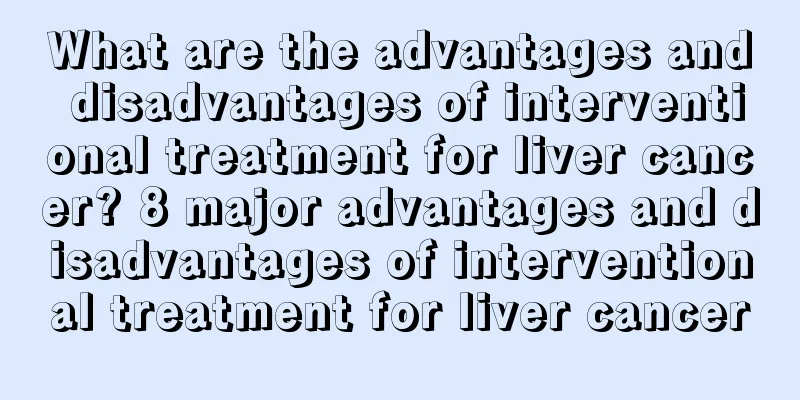What are the advantages and disadvantages of interventional treatment for liver cancer? 8 major advantages and disadvantages of interventional treatment for liver cancer

|
Liver cancer is a common cancer in my country. Most patients are at an advanced stage when they seek medical treatment and therefore have lost the chance of surgery. Interventional treatment for liver cancer refers to a type of regional chemotherapy that injects anticancer drugs or embolic agents into the hepatic artery via femoral artery catheterization. It is currently the preferred method for non-laparotomy treatment of liver cancer, and its efficacy has been confirmed. Radiological interventional treatment for liver cancer is also called transcatheter arterial chemoembolization (TACE). Patients often ask about this, and currently this treatment is commonly referred to as interventional treatment. But in fact, there are many other interventional treatment methods. Since Seldinger's creation and improvement of percutaneous arterial puncture technology, especially the development of X-ray television and angiography, radiological interventional treatment has emerged and has made great progress. my country has also accumulated rich experience in liver cancer interventional treatment. The number of cases is the largest in the world. Advantages of interventional treatment for liver cancer 1. The therapeutic effect is definite. Those who are successfully treated can see a rapid decrease in AFp, reduction in tumor size, and relief of pain. 2. Scientific mechanism: The local drug concentration of interventional therapy is dozens of times higher than that of systemic chemotherapy, and it blocks the blood supply to the tumor. Therefore, the two-pronged approach has good efficacy and less toxicity than systemic chemotherapy. 3. Simple and easy operation, safe and reliable. 4. The elderly, weak and those with certain diseases can also undergo the procedure without general anesthesia and they just need to stay awake. 5. The cost is relatively low. 6. It can be repeated, and the diagnostic imaging is clear and easy to compare. 7. Some liver cancers can be reduced in size and then removed in two steps. 8. It can be used as one of the important means of comprehensive treatment of advanced tumors. my country has been carrying out this work for nearly 20 years and has produced many experience summary reports. It has been reported that the 5-year survival rate after treatment of liver cancer with a diameter less than 5CM is as high as 33%. The longest case in our hospital has survived for more than 20 years. Interventional treatment of liver cancer also has its shortcomings or disadvantages 1. Liver cancer's main blood supply depends on the hepatic artery, but the cancer mass is surrounded by the portal vein, so cancer cells can "survive in peace". 2. The operation is somewhat difficult. The catheter should be placed in the blood supply artery in a selective manner to achieve the best effect. However, sometimes it is difficult to enter the hepatic artery. However, some liver cancers can be supplied by multiple blood vessels. 3. Despite super-selective access, there are still obvious side effects. According to the data analysis of our hospital, the most common reactions are in the gastrointestinal tract. 4. Patients with portal vein cancer thrombus should consider removing the cancer thrombus as appropriate. 5. Even if the superselective operation is carried out smoothly, due to reasons such as high-pressure injection, it may cause accidental embolism, shunting and inevitable micro-metastasis. 6. Normal liver cells are still damaged, and a few patients even suffer from liver dysfunction. 7. The therapeutic effect is not satisfactory for patients with large cancer masses. 8. Some patients’ blood vessels are blocked after one treatment, making further operations difficult. Therefore, regardless of whether the interventional treatment of liver cancer is successful or not, active prevention and treatment are still necessary. In order to achieve good therapeutic effects, the following matters should be noted 1. Choose the right indication. 2. It should be performed by a hospital with sufficient experience and good equipment. 3. Protect liver cells and prevent complications. 4. The operation is safe and short-term, and the patient should avoid mental stress 5. Before and after the operation, you should pay attention to improving immunity and use biological response modifiers. For example, the traditional Chinese medicine "Tian Fuxing" can protect the liver, fight cancer, strengthen the body and have other multi-target functions, which can assist the operation to be effective and reduce side effects. 6. Regular check-ups are necessary to prevent recurrence and metastasis, as liver cancer tends to occur in multiple centers. 7. Continue to adopt comprehensive treatment. |
Recommend
Is bad breath caused by disease? What caused it?
Bad breath is a very disturbing symptom because t...
Biochemical recurrence criteria for prostate cancer
What are the criteria for biochemical recurrence ...
Dietary precautions for constipation and anal bleeding
Nowadays, many people are under a lot of stress a...
What are some exercises for patellar arthritis?
Exercise is an important way to maintain good hea...
Why do I always feel sleepy and lack energy?
If you always feel that you have no energy and do...
What are the late symptoms of lung cancer brain metastasis? Pay attention to these needle-shaped
Lung cancer can metastasize. If it metastasizes t...
Good melanoma hospital
Melanoma is a malignant tumor originating from me...
There are five main symptoms of hidradenitis
Hidradenitis generally occurs in the subcutaneous...
Is stomach pain after eating stomach cancer?
Is stomach pain after eating stomach cancer? Acco...
How to have a healthy diet for gallbladder cancer
In recent years, gallbladder cancer has become on...
How to distinguish early and late stages of bladder cancer
Bladder cancer is a common malignant tumor and a ...
Saliva after tooth extraction
Many people have a lot of saliva after having a t...
What are the long-distance running methods and precautions?
Running is a relatively light form of exercise, s...
What is the best way to treat external hemorrhoids?
External hemorrhoids are actually a kind of disea...
What kind of fruit is Ginkgo biloba
What kind of fruit is ginkgo? Many people may not...









